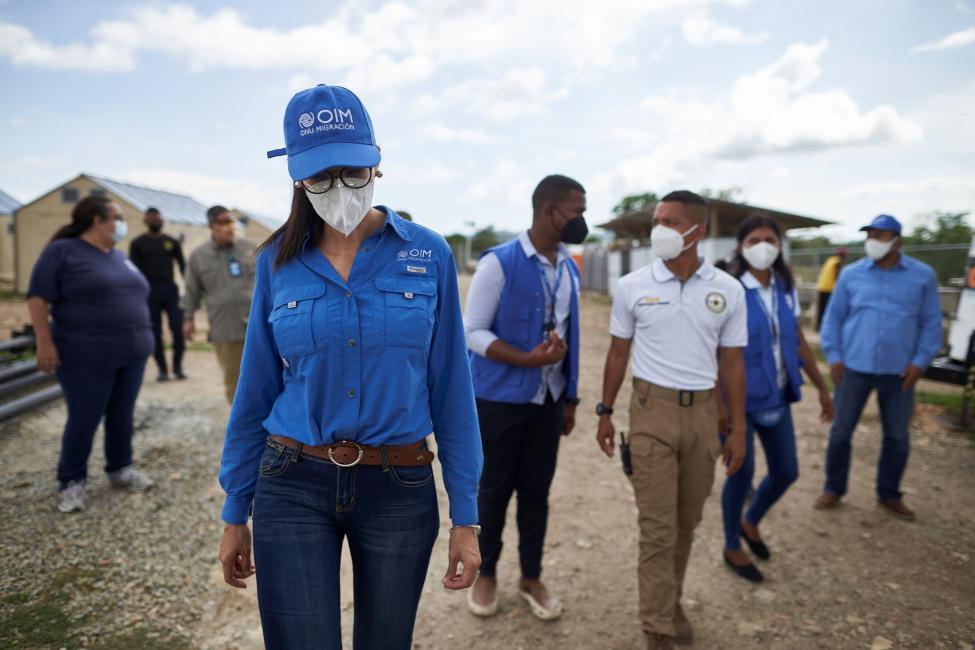-
Quiénes Somos
Quienes somosLa Organización Internacional para las Migraciones (OIM) forma parte del Sistema de las Naciones Unidas y es la organización intergubernamental líder que promueve desde 1951 una migración humana y ordenada para beneficio de todos, con 174 Estados Miembros y presencia en más de 100 países. La OIM tiene presencia en Panamá desde 2007.
Sobre nosotros
Sobre nosotros
OIM Global
OIM Global
-
Nuestro Trabajo
Nuestro TrabajoComo organización intergubernamental líder que desde 1951 promueve la migración humana y ordenada, la OIM juega un rol clave en cuanto a apoyar el logro de la Agenda 2030 por medio de diferentes áreas de intervención que conectan a la asistencia humanitaria con el desarrollo sostenible. En Panamá, la OIM ofrece una respuesta integral a las necesidades humanitarias de los migrantes, los desplazados internos, los repatriados y las comunidades de acogida.
Prioridades transversales
Prioridades transversales
- Datos y Recursos
- Actúa
- 2030 Agenda
Panama expands its border security services to guarantee the rights of the migrant population
Meteti, Darien – With the graduation ceremony of its first 150 members, Panama celebrated on April 19 the creation of the Humanitarian Border Security Unit (USFROH). This new unit, which will be part of the Chucunaque Battalion, cements itself as the humanitarian branch of the National Border Service (SENAFRONT) and will offer security to migrant people, as well as preventive patrolling, first aid, rescue and localization of missing people in the jungle, and humanitarian assistance.
The USFROH is established after a conjunct formative process between the International Organization for Migrations (IOM) and SENAFRONT, with the support of the Human Mobility Group within the United Nations System in Panama.
Juan Manuel Pino, minister of Public Security, explained that the arrival of numerous migrants of different nationalities has had a strong impact in Panama, reason for which SENAFRONT created this special unit, so that they receive the humanitarian assistance they require during their stay in Panamanian territory.
“Panama is respectful of the International Humanitarian Law, and so we have demonstrated during the pandemic. The humanitarian aspects regarding the migrants’ stay in Panama were improved last year”, said the head of the Ministry of Public Security.
Minister Pino pointed out that there is currently a controlled flow of migrants entering Panama across the border into Darien, and on their way to Costa Rica. What is sought, he added, is to have the same type of coordination with the Colombian authorities.
“This training received by our units is of great impact, because to us it is important to have a community policeperson inside the Migrant Reception Stations, thus guaranteeing a better humanitarian assistance to the migrants crossing the Darien province”, said Oriel Ortega Benítez, director general of SENAFRONT in Panama.
The ceremony was attended by government authorities, representatives of the diplomatic corps and representatives of programs, funds, and agencies of the United Nations System in Panama.
This activity took place in the context of the strengthening of capacities for the management of mixed migration flows in Panama, executed by IOM through the Regional Migration Program, financed by the Bureau of Population, Refugees, and Migration within the United States Department of State.
The new unit is the operational result of an intersectoral strategy whose goal is to safeguard the safety, dignity, and lives of migrants on their journey to North America through the Darien jungle.
“This clear and precise dimension is one that, without a doubt, can strengthen a good practice in matters of the protection of migrants and one we hope we can continue to strengthen even more to complement the efforts made by the Panamanian government facing the challenges implied in the management of a safe, orderly, regular, and dignified migration through its borders”, expressed Santiago Paz, Head of the Panama Administrative Center and Chief of IOM’s Mission in Panama.
The comprehensive training of the members of USFROH is fundamental to the efforts made through strategies to prevent crime and to protect the Human Rights in the promotion of a good management of migration and to achieve the optimal levels of security within the framework of a culture of peace.
This project is aligned with the 2030 Agenda for Sustainable Development, which recognizes the positive impact migration has on the social and economic development of society. It is made up of 17 Sustainable Development Goals, further broken down into 169 targets, that include specific content referring to international migration. Target 10.7, for example, is to facilitate orderly, safe, regular, and responsible migration and mobility of people, including through the implementation of planned and well-managed migration policies. To End abuse, exploitation, trafficking, and all forms of violence against and torture of children is Target 16.2.
The 2030 Agenda for Sustainable Development was approved in 2015 by 193 Member States of the United Nations who promise to “leave no one behind”, protect migrants in situations of vulnerability, and put an end to human trafficking, labor exploitations, abuse, violence, and discrimination.
For further information, contact Mayteé Zachrisson, Communications and Media Assistant at IOM in Panama, via mzachrisson@iom.int.
